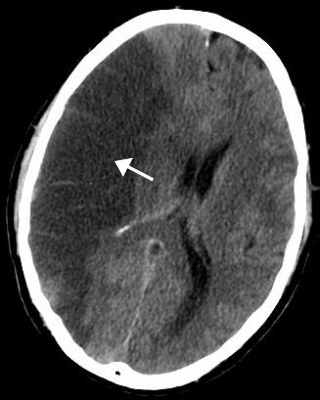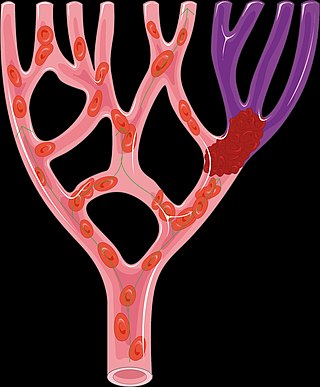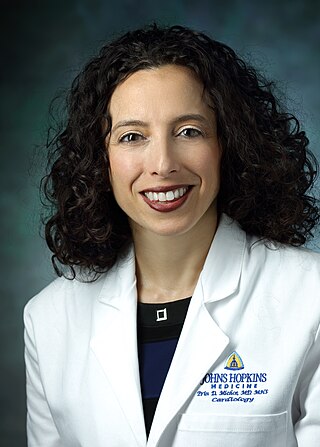Related Research Articles
A transient ischemic attack (TIA), commonly known as a mini-stroke, is a minor stroke whose noticeable symptoms usually end in less than an hour. TIA causes the same symptoms associated with strokes, such as weakness or numbness on one side of the body, sudden dimming or loss of vision, difficulty speaking or understanding language, slurred speech, or confusion.

Cardiac arrest is when the heart stops beating. It is a medical emergency that, without immediate medical intervention, will result in cardiac death within minutes. When it happens suddenly, it is called sudden cardiac arrest. Cardiopulmonary resuscitation (CPR) and possibly defibrillation are needed until further treatment can be provided. Cardiac arrest results in a rapid loss of consciousness, and breathing may be abnormal or absent.

Cardiopulmonary resuscitation (CPR) is an emergency procedure consisting of chest compressions often combined with artificial ventilation in an effort to manually preserve intact brain function until further measures are taken to restore spontaneous blood circulation and breathing in a person who is in cardiac arrest. It is recommended in those who are unresponsive with no breathing or abnormal breathing, for example, agonal respirations.

Cerebrovascular disease includes a variety of medical conditions that affect the blood vessels of the brain and the cerebral circulation. Arteries supplying oxygen and nutrients to the brain are often damaged or deformed in these disorders. The most common presentation of cerebrovascular disease is an ischemic stroke or mini-stroke and sometimes a hemorrhagic stroke. Hypertension is the most important contributing risk factor for stroke and cerebrovascular diseases as it can change the structure of blood vessels and result in atherosclerosis. Atherosclerosis narrows blood vessels in the brain, resulting in decreased cerebral perfusion. Other risk factors that contribute to stroke include smoking and diabetes. Narrowed cerebral arteries can lead to ischemic stroke, but continually elevated blood pressure can also cause tearing of vessels, leading to a hemorrhagic stroke.

A stroke is a medical condition in which poor blood flow to the brain causes cell death. There are two main types of stroke: ischemic, due to lack of blood flow, and hemorrhagic, due to bleeding. Both cause parts of the brain to stop functioning properly.

Alteplase (t-PA), a biosynthetic form of human tissue-type plasminogen activator (t-PA), is a thrombolytic medication, used to treat acute ischemic stroke, acute ST-elevation myocardial infarction, pulmonary embolism associated with low blood pressure, and blocked central venous catheter. It is given by injection into a vein or artery. Alteplase is the same as the normal human plasminogen activator produced in vascular endothelial cells and is synthesized via recombinant DNA technology in Chinese hamster ovary cells (CHO). Alteplase causes the breakdown of a clot by inducing fibrinolysis.

Children's Hospital Los Angeles (CHLA) is a nationally ranked, freestanding acute care children's hospital in the East Hollywood district of Los Angeles, on Sunset Boulevard at the corner of Vermont Avenue. The hospital has been academically affiliated with the Keck School of Medicine of the University of Southern California since 1932 and the hospital features 401 pediatric beds. The hospital provides comprehensive pediatric specialties and subspecialties to infants, children, teens, and young adults generally aged 0–21 throughout California and the west coast. The hospital also sometimes treats adults that require pediatric care. The hospital has a rooftop helipad and is an ACS verified level I pediatric trauma center, one of a few in the region. The hospital features a regional pediatric intensive-care unit and an American Academy of Pediatrics verified level IV neonatal intensive care unit.

Carotid artery stenosis is a narrowing or constriction of any part of the carotid arteries, usually caused by atherosclerosis.

Intracerebral hemorrhage (ICH), also known as cerebral bleed, intraparenchymal bleed, and haemorrhagic stroke, is a sudden bleeding into the tissues of the brain, into its ventricles, or into both. An ICH is one kind of bleeding within the skull and one kind of stroke. Symptoms can include headache, one-sided weakness, vomiting, seizures, decreased level of consciousness, and neck stiffness. Often, symptoms get worse over time. Fever is also common.
The Zilkha Neurogenetic Institute on the University of Southern California campus is a neurological and psychiatric diseases research facility. It is an organized research unit of the Keck School of Medicine of USC.
The National Institutes of Health Stroke Scale, or NIH Stroke Scale (NIHSS), is a tool used by healthcare providers to objectively quantify the impairment caused by a stroke. The NIHSS is composed of 11 items, each of which scores a specific ability between a 0 and 4. For each item, a score of 0 typically indicates normal function in that specific ability, while a higher score is indicative of some level of impairment. The individual scores from each item are summed in order to calculate a patient's total NIHSS score. The maximum possible score is 42, with the minimum score being a 0.
Clinical neuroscience is a branch of neuroscience that focuses on the scientific study of fundamental mechanisms that underlie diseases and disorders of the brain and central nervous system. It seeks to develop new ways of conceptualizing and diagnosing such disorders and ultimately of developing novel treatments.
This article describes disparities existing between men and women in accessing and receiving care for a stroke. This article also describes factors outside of the health care system which contribute to this disparity.

Joel Salinas is an American-born Nicaraguan neurologist, writer, and researcher, who is currently an Assistant Professor of Neurology at Harvard Medical School. He practices general neurology, with subspecialty in behavioral neurology and neuropsychiatry, at the Massachusetts General Hospital in Boston, Massachusetts. He is also a clinician-scientist at the Harvard T.H. Chan School of Public Health and the Framingham Study at the Boston University School of Medicine.

Erin Kathleen Donnelly Michos is an American cardiologist. She is an associate professor of Medicine and Director of Women's Cardiovascular Health at Johns Hopkins School of Medicine. Michos is also an Associate Faculty of the Welch Center for Prevention, Epidemiology and Clinical Research at Johns Hopkins, and has a joint faculty appointment in the Department of Epidemiology at the Johns Hopkins Bloomberg School of Public Health.

Girardin Jean-Louis is an American academic who is a Professor in the Departments of Psychiatry and Neurology at the University of Miami, Miller School of Medicine. He serves as Director of the Translational Sleep and Circadian Sciences Program and the "Program to Increase Diversity among Individuals Engaged in Health-Related Research" Institute. Dr. Jean-Louis’ translational behavioral sleep and circadian research was recently featured in Science and NPR. In 2020, he was named ‘Pioneer in Minority Health and Health Disparities’ and one of the Community of Scholars' most inspiring Black scientists in America. In 2021, he received the Mary A. Carskadon Outstanding Educator Award from the Sleep Research Society, and in 2022 the Diversity, Equity, and Inclusion Leadership Award from the American Academy of Sleep Medicine.
Tatjana Rundek is an American neurologist and epidemiologist. She is the Director of the Clinical Translational Research Division, Vice Chair of the Clinical Translational Research Neurology, and Evelyn F. McKnight Endowed Chair for Learning and Memory in Aging at the University of Miami's Leonard M. Miller School of Medicine.
Michelle Asha Albert is an American physician who is the Walter A. Haas Lucie-Stern Endowed Chair in Cardiology and professor of medicine at the University of California, San Francisco. Albert is director of the UCSF Center for the Study of Adversity and Cardiovascular Disease. She is president of the American Heart Association. She served as the president of the Association of Black Cardiologists in 2020–2022 and as president of the Association of University Cardiologists (2021–2022). Albert is an elected member of the National Academy of Medicine and the American Society of Clinical Investigators.
Lynda D. Lisabeth is an American epidemiologist who is Professor and Senior Associate Dean for Faculty Affairs in the School of Public Health at the University of Michigan. Her research considers the epidemiology of stroke in the United States, and she has worked with the National Institute of Neurological Disorders and Stroke on the advancement of stroke research.

Renee Yuen-Jan Hsia is an American emergency physician. She is a professor of Emergency Medicine and Associate Chair of Health Services Research at the University of California, San Francisco, as well as an attending physician in the emergency department at the Zuckerberg San Francisco General Hospital and Trauma Center. She is also a core faculty member of the UCSF Philip R. Lee Institute for Health Policy Studies. Her research is aimed at studying how health services and regionalization of care impact access to emergency care.
References
- 1 2 "Amytis "Amy" Towfighi, MD". Southern California Clinical and Translational Science Institute. Retrieved September 22, 2019.
- ↑ "Amytis Towfighi". Keck School of Medicine of USC. 31 July 2018. Retrieved September 22, 2019.
- ↑ "California Neurologist Receives AAN Michael S. Pessin Stroke Leadership Prize". American Academy of Neurology. March 1, 2013. Retrieved September 22, 2019.
- ↑ "American Stroke Association Recognizes Outstanding Contributors to Stroke and New Investigators". GlobeNewswire News Room. 1 February 2012.
- ↑ "Class of 2018". American Heart Association. Retrieved September 22, 2019.
- ↑ Towfighi, Amytis; Ovbiagele, Bruce; El Husseini, Nada; Hackett, Maree L.; Jorge, Ricardo E.; Kissela, Brett M.; Mitchell, Pamela H.; Skolarus, Lesli E.; Whooley, Mary A.; Williams, Linda S. (1 February 2017). "Poststroke Depression: A Scientific Statement for Healthcare Professionals From the American Heart Association/American Stroke Association". Stroke. 48 (2): e30–e43. doi: 10.1161/STR.0000000000000113 . S2CID 1200739 . Retrieved 9 June 2020.
- ↑ Cornier, Marc-Andre; Després, Jean-Pierre; Davis, Nichola; Grossniklaus, Daurice A.; Klein, Samuel; Lamarche, Benoit; Lopez-Jimenez, Francisco; Rao, Goutham; St-Onge, Marie-Pierre; Towfighi, Amytis; Poirier, Paul (1 November 2011). "Assessing Adiposity". Circulation. 124 (18): 1996–2019. doi: 10.1161/CIR.0b013e318233bc6a . PMID 21947291.
- ↑ Johnson, Rachel K.; Lichtenstein, Alice H.; Anderson, Cheryl A.M.; Carson, Jo Ann; Després, Jean-Pierre; Hu, Frank B.; Kris-Etherton, Penny M.; Otten, Jennifer J.; Towfighi, Amytis; Wylie-Rosett, Judith (28 August 2018). "Low-Calorie Sweetened Beverages and Cardiometabolic Health: A Science Advisory From the American Heart Association". Circulation. 138 (9): e126–e140. doi: 10.1161/CIR.0000000000000569 . PMID 30354445. S2CID 207656098.